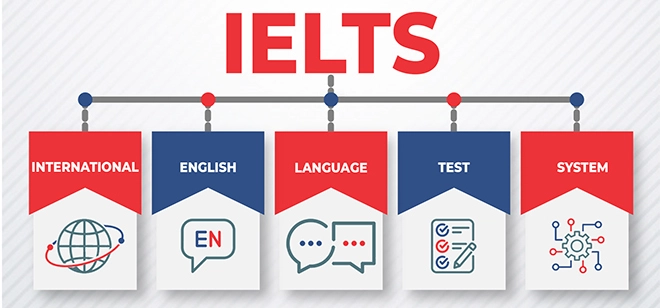What is the overview of IELTS exam?
The International English Language Testing System (IELTS) is a widely accepted English language competency test used to evaluate the language skills of non-native English speakers. It is accepted by educational institutions, employers, and immigration authorities in many English-speaking countries. Here is an overview of the IELTS exam:
Test Formats
IELTS is available in two formats, and test-takers can choose the one that best suits their needs:
IELTS Academic:
This version is designed for individuals applying to study at undergraduate or postgraduate levels, as well as for professional registration purposes.
IELTS General Training:
This version is suitable for those planning to migrate to English-speaking countries for work or training purposes. It is also used for secondary education admissions and work experience.
Test Sections
The IELTS exam is divided into four major components, each meant to assess a particular language skill:
Listening (30 minutes):
This section includes four recorded monologues and discussions. Test-takers listen to a range of accents and answer questions based on the audio content.
Reading (60 minutes):
The reading section consists of three passages with various question styles. It assesses the ability to comprehend and interpret information from academic or general interest exts.
Writing (60 minutes):
The writing section has two tasks:
Task 1 (Academic): Test-takers describe visual information presented in a graph, table, chart, or diagram.
Ta1 (General Training): Test-takers write a letter in response to a given situation.
Task 2 (Both Versions): Test-takers write an essay in response to a point of view, argument, or problem.
Speaking (11-14 minutes)
The speaking section consists of a face-to-face interview with a certified examiner. It assesses the ability to communicate ideas and opinions on familiar topics and engage in a discussion.
Scoring:
Each section of the IELTS exam is scored on a band scale from 1 to 9, with 1 being the lowest and 9 the highest. The total band score is calculate by averaging the four individual section scores.
Test Duration
The IELTS exam takes roughly 2 hours and 45 minutes. The listening, reading, and writing sections are completed in one sitting, while the speaking section may be conducted on the same day or up to a week before or after the other three sections.
Test Dates and Locations
IELTS is offer on various dates throughout the year, and test-takers can choose a date and location that is convenient for them. Test centers are located in numerous cities worldwide.
Preparation
Preparation for the IELTS exam is crucial. There are various resources available, including practice materials, sample tests, and preparation courses. Familiarizing oneself with the test format and practicing under timed conditions can help improve performance.
Validity
IELTS scores are generally valid for two years. After this period, the scores expire, and test-takers may need to retake the exam if they require up-to-date results.
Acceptance:
Best IELTS Coaching in Chandigarh sector 34 scores are widely accepted by educational institutions, employers, and immigration authorities in countries such as the United Kingdom, Australia, Canada, New Zealand, and many others.
It’s important for test-takers to check the specific requirements of the institution or organization they are applying to, as score requirements may vary. Additionally, understanding the differences between the Academic and General Training versions is essential for selecting the appropriate test format.
How can I improve my listening score in IELTS?
Improving your listening skills for the IELTS exam involves practice, familiarization with the test format, and honing specific techniques. Here are some tips to help you enhance your listening score in IELTS:
Practice Regularly
Regular practice is crucial. Listen to a variety of English materials, including podcasts, news broadcasts, lectures, and audiobooks. This exposure to diverse accents and speaking styles will help you become more comfortable with different forms of spoken English.
Use Authentic IELTS Materials:
Familiarize yourself with the IELTS listening test format by using official practice materials provided by Cambridge, the British Council, or IDP. This will give you a sense of the types of questions you will encounter and the pacing of the test.
Simulate Test Conditions
Practice under timed conditions to simulate the actual test environment. This will help you manage your time effectively during the test and improve your ability to concentrate for the full duration.
Focus on Understanding Main Ideas:
Understand the main ideas and general themes of the listening passages. While details are important, it’s crucial to grasp the overall message to answer questions accurately.
Develop Note-Taking Skills
Practice taking concise and effective notes while listening. Focus on key information, such as names, dates, locations, and main ideas. This will help you recall information when answering questions.
Predict Answers:
Anticipate what the speaker might say next based on the context. This can help you stay engaged and anticipate the information needed to answer upcoming questions.
Improve Vocabulary
Expand your English vocabulary, especially in contextually relevant areas. A broader vocabulary will aid in understanding a wider range of topics during the listening test.
Enhance Pronunciation Awareness
Pay attention to English pronunciation, including different accents. This can improve your ability to understand spoken English, especially in situations where speakers may have varying accents.
Listen for Signal Words
Identify signal words that indicate a change in topic, a contrast, or a specific detail. These words can guide you through the structure of the listening passages.
Remember that consistent and focused practice is key to improving your listening skills. By incorporating these strategies into your preparation routine, you can build confidence and perform well in the listening section of the IELTS Coaching in Chandigarh sector 34exam.
Read more article:- Magzinerate


